-
 Bitcoin
Bitcoin $84,705.5206
1.96% -
 Ethereum
Ethereum $1,882.8342
2.59% -
 Tether USDt
Tether USDt $0.9999
-0.02% -
 XRP
XRP $2.1020
-0.02% -
 BNB
BNB $603.8511
-0.82% -
 Solana
Solana $124.7702
-1.25% -
 USDC
USDC $0.9999
-0.01% -
 Dogecoin
Dogecoin $0.1717
1.76% -
 Cardano
Cardano $0.6717
0.25% -
 TRON
TRON $0.2380
0.73% -
 Toncoin
Toncoin $3.9856
-3.94% -
 Chainlink
Chainlink $13.7866
0.95% -
 UNUS SED LEO
UNUS SED LEO $9.4087
2.25% -
 Stellar
Stellar $0.2691
1.18% -
 Avalanche
Avalanche $19.3533
1.55% -
 Sui
Sui $2.3689
0.72% -
 Shiba Inu
Shiba Inu $0.0...01244
-1.74% -
 Hedera
Hedera $0.1666
1.40% -
 Polkadot
Polkadot $4.1088
0.73% -
 Litecoin
Litecoin $83.2182
-0.74% -
 MANTRA
MANTRA $6.2222
-1.29% -
 Bitcoin Cash
Bitcoin Cash $306.0723
0.08% -
 Bitget Token
Bitget Token $4.6091
0.13% -
 Dai
Dai $1.0000
0.02% -
 Ethena USDe
Ethena USDe $0.9999
-0.01% -
 Pi
Pi $0.6919
-3.31% -
 Hyperliquid
Hyperliquid $13.1957
-3.08% -
 Monero
Monero $219.3099
1.05% -
 Uniswap
Uniswap $6.1691
2.09% -
 Pepe
Pepe $0.0...07614
3.60%
What are the market volatility time characteristics of Bitcoin ETF?
Bitcoin ETF volatility varies across timeframes: intraday sees rollercoaster price swings, while weekly/monthly charts show trends and corrections, and yearly views reflect long-term patterns.
Mar 27, 2025 at 11:49 am
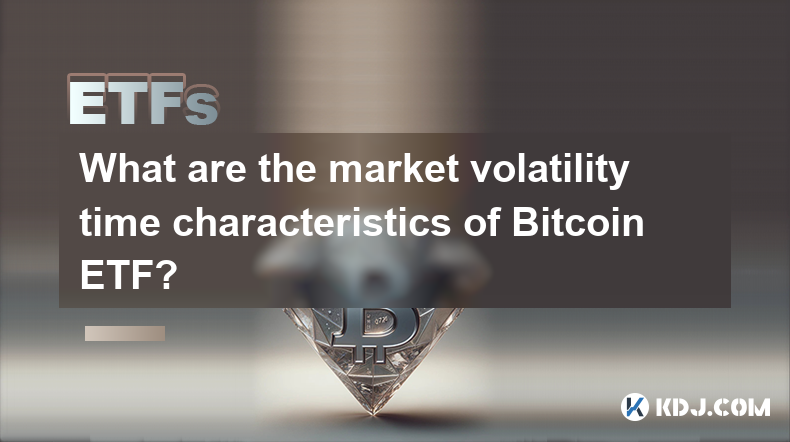
Understanding Bitcoin ETF Volatility
A Bitcoin ETF (Exchange-Traded Fund) tracks the price of Bitcoin, offering investors exposure to the cryptocurrency market through traditional stock exchanges. However, inheriting Bitcoin's inherent volatility, a Bitcoin ETF will also experience significant price swings. Understanding the time characteristics of this volatility is crucial for informed investment decisions. This means examining how volatility changes across different timeframes – from short-term intraday fluctuations to longer-term trends.
Intraday Volatility: The Rollercoaster Ride
Intraday volatility, or price changes within a single trading day, is typically high for Bitcoin and, consequently, for a Bitcoin ETF. News events, trading algorithm activity, and even social media sentiment can trigger sharp, rapid price movements. This makes short-term trading particularly risky. Scalping or day trading a Bitcoin ETF requires a high tolerance for risk and sophisticated trading strategies. The speed of these price shifts necessitates constant monitoring and quick decision-making.
Weekly and Monthly Volatility: Trends and Corrections
Looking at weekly and monthly charts reveals a different picture. While still volatile, the price fluctuations are less extreme than intraday movements. These longer timeframes allow for the identification of trends, whether bullish or bearish. Corrections, or temporary price drops within an upward trend, are a normal part of the Bitcoin market and will be reflected in a Bitcoin ETF. Understanding these patterns can help investors time their entries and exits more effectively.
Yearly Volatility: The Big Picture
Yearly volatility provides a long-term perspective. It shows the overall price performance of Bitcoin over extended periods, including significant bull and bear markets. A Bitcoin ETF’s yearly volatility will likely mirror Bitcoin's historical patterns, showcasing periods of substantial growth followed by sharp corrections. This long-term view is vital for investors with a longer-term investment horizon. It's important to remember that past performance is not indicative of future results.
Factors Influencing Bitcoin ETF Volatility
Several factors contribute to the time-dependent volatility of a Bitcoin ETF. These include:
- Regulatory Uncertainty: Changes in regulatory frameworks concerning cryptocurrencies can significantly impact Bitcoin's price and, therefore, the ETF's price.
- Market Sentiment: Investor confidence and overall market sentiment play a crucial role. Positive news can drive prices up, while negative news can trigger sell-offs.
- Technological Developments: Advancements in blockchain technology or the emergence of competing cryptocurrencies can influence Bitcoin's value.
- Macroeconomic Factors: Global economic events, such as inflation or recessionary fears, can impact investor appetite for risk assets like Bitcoin and its associated ETF.
- Bitcoin Mining Difficulty: Changes in the difficulty of mining Bitcoin can affect its supply and, consequently, its price.
- Adoption Rate: Increased adoption of Bitcoin by businesses and institutions can lead to price appreciation.
Managing Volatility Risk in Bitcoin ETF Investments
Investors looking to mitigate volatility risk in a Bitcoin ETF should consider the following:
- Diversification: Don't put all your eggs in one basket. Diversify your investment portfolio to reduce overall risk.
- Dollar-Cost Averaging (DCA): Invest a fixed amount of money at regular intervals, regardless of the price. This strategy helps reduce the impact of volatility.
- Long-Term Perspective: Focus on the long-term potential of Bitcoin rather than short-term price fluctuations.
- Risk Tolerance: Only invest an amount you are comfortable losing.
- Thorough Research: Understand the risks involved before investing in a Bitcoin ETF.
Frequently Asked Questions
Q: How does the volatility of a Bitcoin ETF compare to traditional stock market ETFs?
A: Bitcoin ETFs are significantly more volatile than traditional stock market ETFs. Traditional ETFs tend to track more stable assets, resulting in smoother price movements. Bitcoin's inherent volatility translates directly to its ETF counterpart.
Q: Are there specific times of day when Bitcoin ETF volatility is higher?
A: Volatility tends to be higher during periods of overlapping trading sessions across different global markets. For example, the overlap between Asian and European markets, and then European and US markets, often sees increased trading activity and price swings.
Q: Can I use options strategies to manage the volatility risk of a Bitcoin ETF?
A: Yes, options strategies, such as covered calls or protective puts, can be used to manage risk and potentially profit from volatility. However, these strategies require a strong understanding of options trading and carry their own set of risks.
Q: How do news events affect the short-term volatility of a Bitcoin ETF?
A: News events, whether positive or negative, can significantly impact short-term volatility. Positive news tends to drive prices up, potentially leading to sharp increases in the ETF's price. Conversely, negative news can trigger sell-offs and rapid price declines.
Q: What are the implications of high volatility for long-term Bitcoin ETF investors?
A: High volatility can create both opportunities and challenges for long-term investors. While price swings can be unsettling, they also present opportunities to buy at lower prices during corrections. A long-term perspective and a robust risk management strategy are crucial.
Q: Does the regulatory environment impact the volatility of a Bitcoin ETF?
A: Absolutely. Regulatory clarity and favorable policies tend to reduce volatility, while uncertainty and negative regulatory developments can increase it. The regulatory landscape is a significant factor influencing investor confidence and overall market stability.
Disclaimer:info@kdj.com
The information provided is not trading advice. kdj.com does not assume any responsibility for any investments made based on the information provided in this article. Cryptocurrencies are highly volatile and it is highly recommended that you invest with caution after thorough research!
If you believe that the content used on this website infringes your copyright, please contact us immediately (info@kdj.com) and we will delete it promptly.
- Santiment Released Data Offering Insights for Spotting Market Dips
- 2025-04-02 11:35:12
- Have You Ever Wondered What It Would Be Like to Invest in the Next Big Meme Coin Before It Skyrockets?
- 2025-04-02 11:35:12
- Circle, the company behind the USDC stablecoin, has filed for an initial public offering and plans to list its shares on the New York Stock Exchange
- 2025-04-02 11:30:12
- Circle, the company behind USDC stablecoin, has filed for an initial public offering and plans to list on the New York Stock Exchange
- 2025-04-02 11:30:12
- Circle, the company behind the USDC stablecoin, has filed for an initial public offering and plans to list on the New York Stock Exchange.
- 2025-04-02 11:25:12
- Hyperliquid's Centralized Twist Exposes the Paradox of Decentralized Finance
- 2025-04-02 11:25:12
Related knowledge
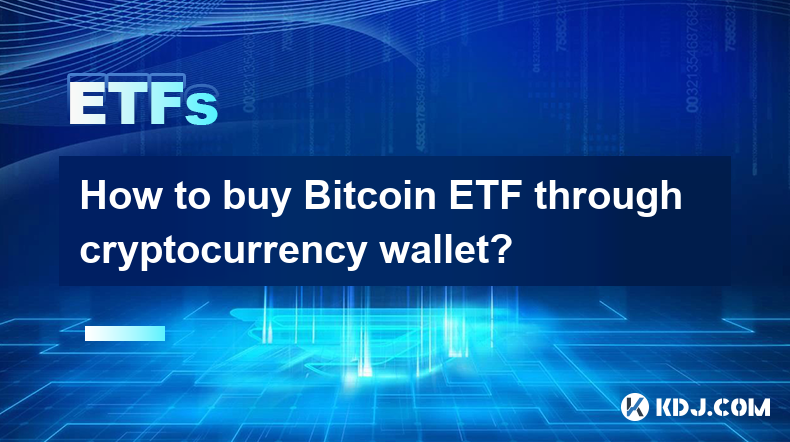
How to buy Bitcoin ETF through cryptocurrency wallet?
Mar 30,2025 at 08:22pm
It's important to understand that you cannot directly buy a Bitcoin ETF through a cryptocurrency wallet. Cryptocurrency wallets are designed to hold and manage digital assets like Bitcoin itself, not exchange-traded funds (ETFs). Bitcoin ETFs are traded on traditional stock exchanges, not decentralized cryptocurrency exchanges. Therefore, the process i...
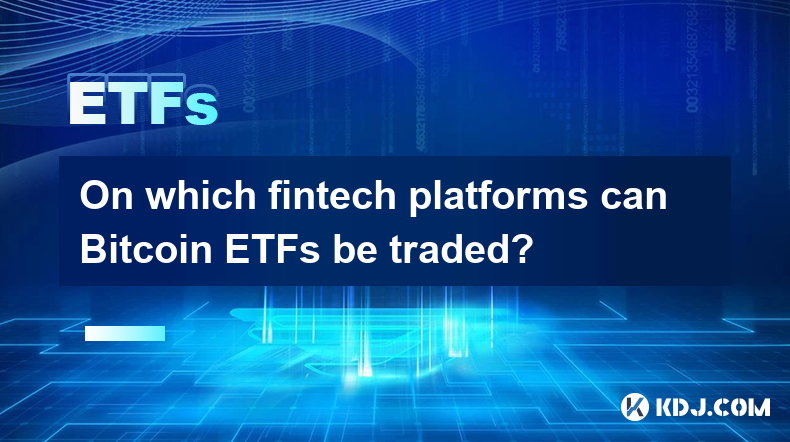
On which fintech platforms can Bitcoin ETFs be traded?
Mar 28,2025 at 09:21am
Navigating the Bitcoin ETF Landscape on Fintech PlatformsThe availability of Bitcoin ETFs on fintech platforms is a rapidly evolving landscape. Currently, the approval and subsequent listing of Bitcoin ETFs are subject to regulatory hurdles and vary significantly by jurisdiction. Therefore, the specific platforms offering Bitcoin ETF trading depend hea...
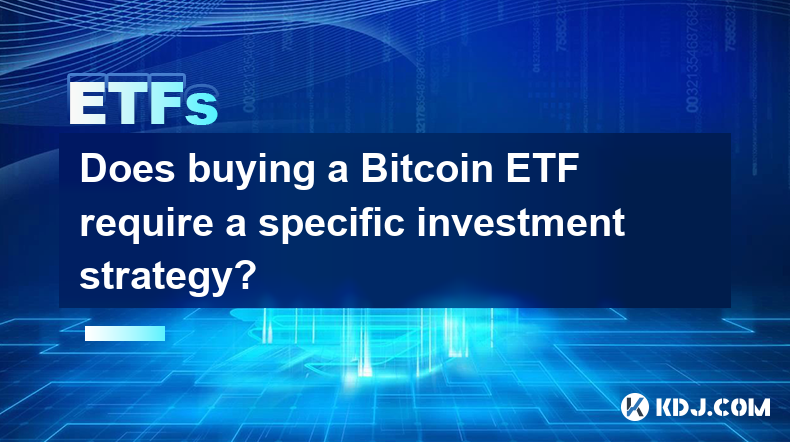
Does buying a Bitcoin ETF require a specific investment strategy?
Mar 27,2025 at 06:36pm
Understanding Bitcoin ETFs and Investment StrategiesA Bitcoin Exchange-Traded Fund (ETF) is a type of investment fund that tracks the price of Bitcoin. Investing in a Bitcoin ETF offers exposure to the cryptocurrency market without the complexities of directly owning and securing Bitcoin. However, like any investment, a successful strategy requires car...
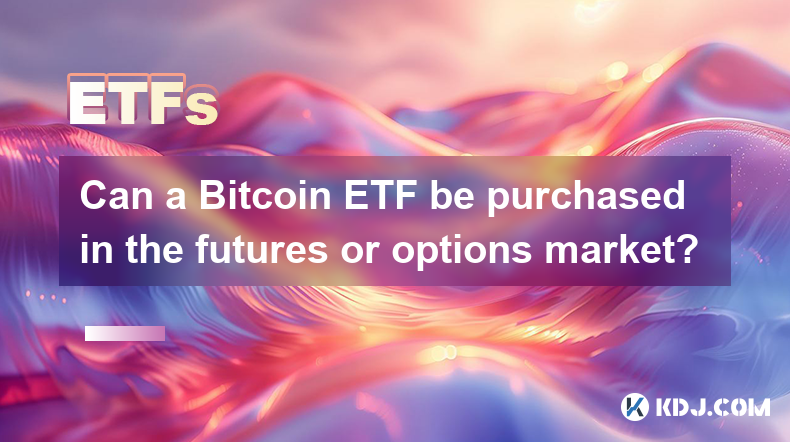
Can a Bitcoin ETF be purchased in the futures or options market?
Mar 27,2025 at 02:49am
Understanding Bitcoin ETFs and Derivative MarketsA Bitcoin ETF (Exchange-Traded Fund) is a fund that tracks the price of Bitcoin. Unlike directly buying Bitcoin, an ETF offers a more regulated and accessible way for investors to gain exposure to the cryptocurrency market through traditional brokerage accounts. However, the availability of a Bitcoin ETF...
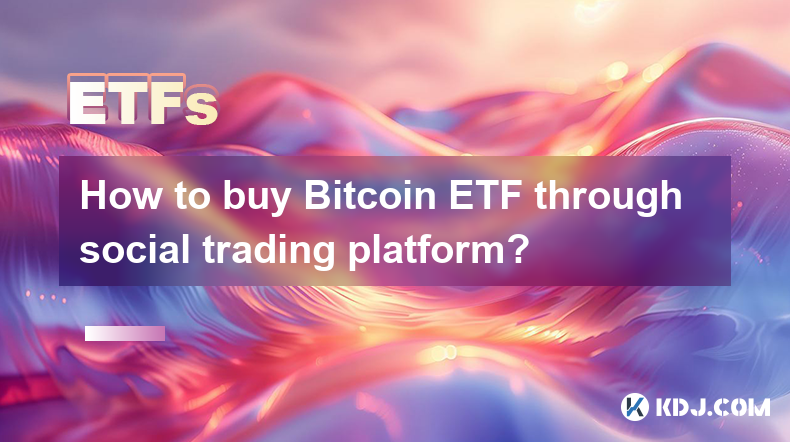
How to buy Bitcoin ETF through social trading platform?
Mar 27,2025 at 10:43am
How to Buy Bitcoin ETF Through Social Trading Platforms? Understanding Bitcoin ETFs and Social TradingA Bitcoin ETF (Exchange-Traded Fund) is a fund that tracks the price of Bitcoin. Unlike directly buying Bitcoin, an ETF offers a regulated and potentially less volatile way to gain exposure to the cryptocurrency market. This is because ETFs are traded o...
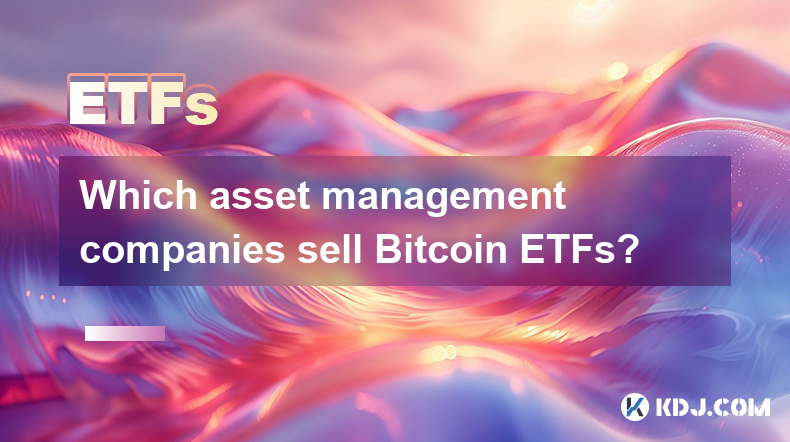
Which asset management companies sell Bitcoin ETFs?
Mar 28,2025 at 02:21am
The Current Landscape of Bitcoin ETF OfferingsCurrently, no asset management company offers a fully-fledged, SEC-approved Bitcoin ETF in the United States. While several companies have filed applications, the Securities and Exchange Commission (SEC) has yet to approve any. This is primarily due to concerns surrounding market manipulation, investor prot...

How to buy Bitcoin ETF through cryptocurrency wallet?
Mar 30,2025 at 08:22pm
It's important to understand that you cannot directly buy a Bitcoin ETF through a cryptocurrency wallet. Cryptocurrency wallets are designed to hold and manage digital assets like Bitcoin itself, not exchange-traded funds (ETFs). Bitcoin ETFs are traded on traditional stock exchanges, not decentralized cryptocurrency exchanges. Therefore, the process i...

On which fintech platforms can Bitcoin ETFs be traded?
Mar 28,2025 at 09:21am
Navigating the Bitcoin ETF Landscape on Fintech PlatformsThe availability of Bitcoin ETFs on fintech platforms is a rapidly evolving landscape. Currently, the approval and subsequent listing of Bitcoin ETFs are subject to regulatory hurdles and vary significantly by jurisdiction. Therefore, the specific platforms offering Bitcoin ETF trading depend hea...

Does buying a Bitcoin ETF require a specific investment strategy?
Mar 27,2025 at 06:36pm
Understanding Bitcoin ETFs and Investment StrategiesA Bitcoin Exchange-Traded Fund (ETF) is a type of investment fund that tracks the price of Bitcoin. Investing in a Bitcoin ETF offers exposure to the cryptocurrency market without the complexities of directly owning and securing Bitcoin. However, like any investment, a successful strategy requires car...

Can a Bitcoin ETF be purchased in the futures or options market?
Mar 27,2025 at 02:49am
Understanding Bitcoin ETFs and Derivative MarketsA Bitcoin ETF (Exchange-Traded Fund) is a fund that tracks the price of Bitcoin. Unlike directly buying Bitcoin, an ETF offers a more regulated and accessible way for investors to gain exposure to the cryptocurrency market through traditional brokerage accounts. However, the availability of a Bitcoin ETF...

How to buy Bitcoin ETF through social trading platform?
Mar 27,2025 at 10:43am
How to Buy Bitcoin ETF Through Social Trading Platforms? Understanding Bitcoin ETFs and Social TradingA Bitcoin ETF (Exchange-Traded Fund) is a fund that tracks the price of Bitcoin. Unlike directly buying Bitcoin, an ETF offers a regulated and potentially less volatile way to gain exposure to the cryptocurrency market. This is because ETFs are traded o...

Which asset management companies sell Bitcoin ETFs?
Mar 28,2025 at 02:21am
The Current Landscape of Bitcoin ETF OfferingsCurrently, no asset management company offers a fully-fledged, SEC-approved Bitcoin ETF in the United States. While several companies have filed applications, the Securities and Exchange Commission (SEC) has yet to approve any. This is primarily due to concerns surrounding market manipulation, investor prot...
See all articles






















































































